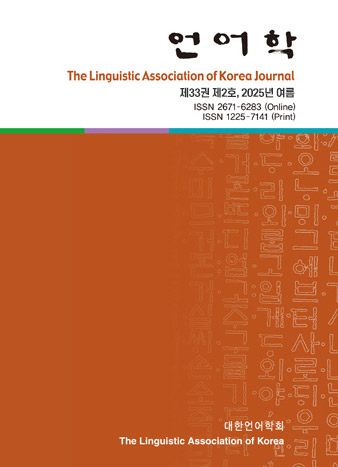대한언어학회 전자저널

Abstract
Darwish, Salma. (2025). A contrastive study of the conjunctive sentence in Korean and Arabic. The Linguistic Association of Korea Journal, 33(2), 51-73. This study aims to identify similarities and differences between Korean and Arabic conjunctive sentence using the contrastive analysis method. The systems of conjunctive sentence in both languages were examined based on relevant theoretical literature, and their syntactic and semantic features were analyzed. It has been delineated that the Arabic Multiple sentence corresponds to the Korean coordinating sentence, and the Arabic complex sentence corresponds to the Korean subordinating sentence. Furthermore, it is revealed that Korean and Arabic connective markers not only do they connect two clauses, but also, they express the semantic relationship between the two clauses. In the context of the conjunctive sentence form, Korean is a converb-type language, while Arabic is a finite verb-type language. Similarly, the conjunctive markers of Arabic and Korean exist in all three types: zero conjunction, single conjunction, and double conjunction. Depending on the syntactic level, Korean conjunctive markers are different, while Arabic can have the same conjunctive markers at all syntactic levels. The coordinating sentence of Korean and both of Multiple sentence and complex sentences of Arabic can only be used for forward substitution, and only pronominalization and zero anaphora are possible. Finally, the Korean conjunctive markers are the underlying determinant for tense constraints, sentence component (subject-predicate) constraints, and grammatical closure constraints. Meanwhile, in Arabic, gender, number, and person must align within the identical components in the preceding and following clauses, consequently, the same case alignment exists between the conjunctive and the connected sentence.
Keywords
# 한국어 접속문(Korean conjunctive sentence) # 아랍어 접속문(Arabic conjunctive sentence) # 접속문 체계(conjunctive sentence system) # 접속표지(connective marker) # 대조 연구(contrastive study)
References
- 고영근, 남기심. (1985). 표준 국어문법론. 탑출판사.
- 권재일. (2012). 한국어 문법론. 태학사.
- 김원필 외. (2008). 언어유형론 2, 격, 부치사, 재귀구문, 접속표현. 월인.
- 남기심. (2001). 현대국어 통사론. 태학사.
- 남기심, 고영근, 유현경, 최형용. (2022). 새로 쓴 표준 국어문법론. 한국문화사. 레티탐. (2023). 한국어와 베트남어의 접속문에 관한 대조 연구. 연세대학교 박사학위 논문.
- 유현경. (1985). 접속문의 통사적 특질 연구. 연세대학교 석사학위논문.
- 유현경. (2011). 접속과 내포. 국어학, 60, 389-410.
- 유현경, 한재영, 김홍범, 이정택, 김성규, 강현화, 구본관, 이병규, 황화상, 이진호. (2019). 한국어 표준 문법. 집문당.
- 이계연. (2004). 아한 번역문에 나타난 결속성 연구. 아랍어와 아랍문학, 8(2), 47-71. 이계연. (2010). 한국어- 아랍어 번역에서의 논리연결 표지 연구. 한국중동학회논총, 30(3), 281-299.
- 이계연. (2012). 한국어와 아랍어 번역의 결속구조 연구. 한국외국어대학교 박사학위논문. 이병학. (2019). 종합 아랍어 문법. 문예림.
- 이익섭, 채완. (1999). 국어문법론강의. 학연사.
- 이익섭. (2005). 한국어문법. 서울대학교출판문화원.
- 정규영. (2016). 아랍어의 접속표현-유형론적 연구. 아랍어와 아랍문학, 20(3), 1-25.
- 장리룽. (2016). 한국어⋅중국어⋅영어 접속표현의 유형론적 대조연구. 전남대학교 박 사학위논문.
- 최재희. (2004). 한국어 문법론. 태학사.
- 샐 리. (2016). 한국어와 아랍어의 내포문 대조 연구 - 아인샴스대학교 학습자의 번역 오류 대상으로-. 아인샴스대학교 석사학위논문.
- Ibrahim Fayz Alasmri. (2016). Conjunction in Translation from English to Arabic: A Corpus-Based Study. Macquarie University. Master thesis.
- Ryding, Karin C. (2005). A Reference Grammar of Modern Standard Arabic. Cambridge: Cambridge University Press.
- .ﻰﻟﻭﻷ ﺍ ﺔﻌﺒﻄﻟﺍ .ﺏﺎﺒﺸﻟﺍ ﺔﺒﺘﻜﻣ .ﻰﻔﺼﻤﻟﺍ ﻮﺤﻨﻟﺍ .(١٩٧١).ﺪﯿﻋ ﺪﻤﺤﻣ
- .ﺔﯿﻧﺎﺜﻟﺍ ﺔﻌﺒﻄﻟﺍ . ﺏﺎﺘﻜﻠﻟ ﺔﻣﺎﻌﻟﺍ ﺔﯾﺮﺼﻤﻟﺍ ﺔﺌﯿﮭﻟﺍ .ﺎﮬﺎﻨﺒﻣﻭ ﺎﮬﺎﻨﻌﻣ ﺔﯿﺑﺮﻌﻟﺍ ﺔﻐﻠﻟﺍ .(١٩٧٩).ﻥﺎﺴﺣ ﻡﺎﻤﺗ
- .ﺔﻌﺳﺎﺘﻟﺍ ﺔﻌﺒﻄﻟﺍ .ﻑﺭﺎﻌﻤﻟﺍ ﺭﺍﺩ .ﻰﻓﺍﻮﻟﺍ ﻮﺤﻨﻟﺍ .(١٩٨٧).ﻦﺴﺣ ﺱﺎﺒﻋ
- .ﻑﺭﺎﻌﻤﻟﺍ ﺓﺄﺸﻨﻣ .ﺔﯾﻮﺤﻧ ﺔﯾﻮﻐﻟ ﺔﺳﺍﺭﺩ ﺔﯿﺑﺮﻌﻟﺍ ﺔﻠﻤﺠﻟﺍ .(١٩٨٨).ﻩﺩﺎﺒﻋ ﻢﯿﮬﺍﺮﺑ◌ﺍ ﺪﻤﺤﻣ